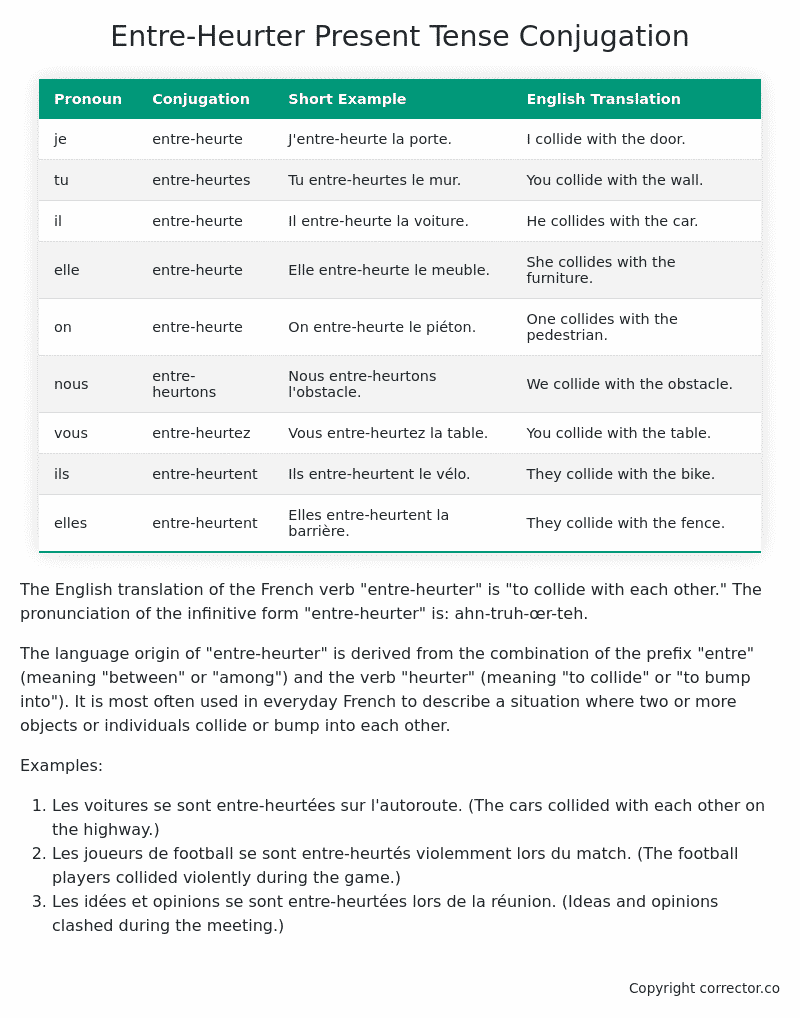Le Present (Present Tense) Conjugation of the French Verb entre-heurter
Introduction to the verb entre-heurter
The English translation of the French verb “entre-heurter” is “to collide with each other.” The pronunciation of the infinitive form “entre-heurter” is: ahn-truh-œr-teh.
The language origin of “entre-heurter” is derived from the combination of the prefix “entre” (meaning “between” or “among”) and the verb “heurter” (meaning “to collide” or “to bump into”). It is most often used in everyday French to describe a situation where two or more objects or individuals collide or bump into each other.
Examples:
- Les voitures se sont entre-heurtées sur l’autoroute. (The cars collided with each other on the highway.)
- Les joueurs de football se sont entre-heurtés violemment lors du match. (The football players collided violently during the game.)
- Les idées et opinions se sont entre-heurtées lors de la réunion. (Ideas and opinions clashed during the meeting.)
Entre-Heurter – About the French Present Tense
To take a deep dive into all the French tenses then see our article on Mastering French Tense Conjugation.
Common Everyday Usage Patterns For Le Present
Interactions with Other Tenses
Table of the Present Tense Conjugation of entre-heurter
| Pronoun | Conjugation | Short Example | English Translation |
|---|---|---|---|
| je | entre-heurte | J’entre-heurte la porte. | I collide with the door. |
| tu | entre-heurtes | Tu entre-heurtes le mur. | You collide with the wall. |
| il | entre-heurte | Il entre-heurte la voiture. | He collides with the car. |
| elle | entre-heurte | Elle entre-heurte le meuble. | She collides with the furniture. |
| on | entre-heurte | On entre-heurte le piéton. | One collides with the pedestrian. |
| nous | entre-heurtons | Nous entre-heurtons l’obstacle. | We collide with the obstacle. |
| vous | entre-heurtez | Vous entre-heurtez la table. | You collide with the table. |
| ils | entre-heurtent | Ils entre-heurtent le vélo. | They collide with the bike. |
| elles | entre-heurtent | Elles entre-heurtent la barrière. | They collide with the fence. |
Other Conjugations for Entre-Heurter.
Le Present (Present Tense) Conjugation of the French Verb entre-heurter (You’re reading it right now!)
Imparfait (Imperfect) Tense Conjugation of the French Verb entre-heurter
Passé Simple (Simple Past) Tense Conjugation of the French Verb entre-heurter
Passé Composé (Present Perfect) Tense Conjugation of the French Verb entre-heurter
Futur Simple (Simple Future) Tense Conjugation of the French Verb entre-heurter
Futur Proche (Near Future) Tense Conjugation of the French Verb entre-heurter
Plus-que-parfait (Pluperfect) Tense Conjugation of the French Verb entre-heurter
Passé Antérieur (Past Anterior) Tense Conjugation of the French Verb entre-heurter
Futur Antérieur (Future Anterior) Tense Conjugation of the French Verb entre-heurter
Subjonctif Présent (Subjunctive Present) Tense Conjugation of the French Verb entre-heurter
Subjonctif Passé (Subjunctive Past) Tense Conjugation of the French Verb entre-heurter
Subjonctif Imparfait (Subjunctive Imperfect) Tense Conjugation of the French Verb entre-heurter
Conditionnel Présent (Conditional Present) Tense Conjugation of the French Verb entre-heurter
Conditionnel Passé (Conditional Past) Tense Conjugation of the French Verb entre-heurter
Conditionnel Passé II (Conditional Past II) Tense Conjugation of the French Verb entre-heurter
L’impératif Présent (Imperative Present) Tense Conjugation of the French Verb entre-heurter
L’impératif Passé (Imperative Past) Tense Conjugation of the French Verb entre-heurter
L’infinitif Présent (Infinitive Present) Tense Conjugation of the French Verb entre-heurter
L’infinitif Passé (Infinitive Past) Tense Conjugation of the French Verb entre-heurter
Le Participe Présent (Present Participle) Tense Conjugation of the French Verb entre-heurter
Le Participe Passé (Past Participle) Tense Conjugation of the French Verb entre-heurter
Struggling with French verbs or the language in general? Why not use our free French Grammar Checker – no registration required!
Get a FREE Download Study Sheet of this Conjugation 🔥
Simply right click the image below, click “save image” and get your free reference for the entre-heurter present tense conjugation!

I hope you enjoyed this article on the verb entre-heurter. Still in a learning mood? Check out another TOTALLY random French verb present conjugation!


